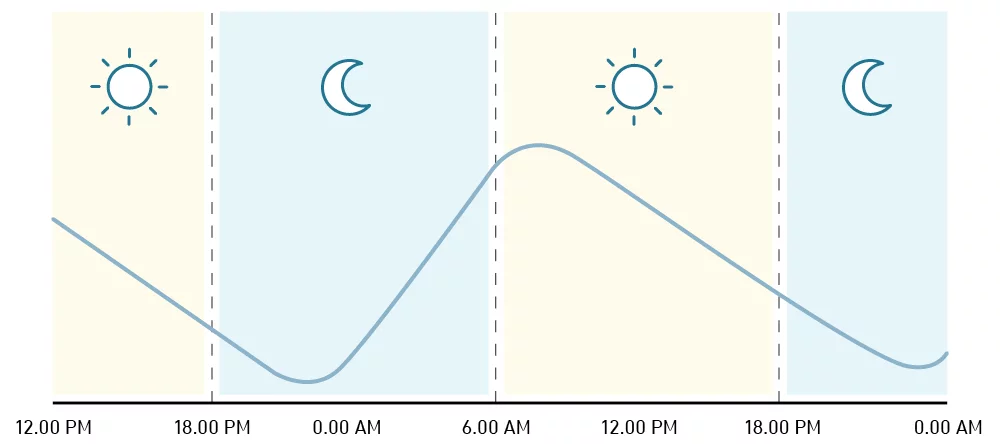
Cortisol is a stress hormone designed to make us alert. We have some of it in our blood throughout the day, but not always the same amount. The cortisol level follows a curve, reaching its lowest point in the middle of the night sleep and it peaks when we wake up in the morning. From the peak in the morning it slowly starts dropping throughout the day, until it’s low enough for us to fall asleep.
Caffeine and Stress
A popular way to manipulate the cortisol level is caffeine consumption. The more coffee or cola we consume, the more cortisol is emitted by the adrenal glands. This can be very helpful to remain focused, but becomes a problem when it’s too much or too late. Caffeine remains in the system for around half a day, before it loses its effect on us.
Most prominent influence on the cortisol level besides stimulants is of course stress. This can be psychological stress, but also physiological stress because of an injury. In general, cortisol can influence our sleep in three ways, of which the first factor is likely due to external stimuli, while the other two are more likely to be stress related.
- If cortisol is too high in the evening, we cannot fall asleep. Falling asleep will only be possible, when it drops below a certain threshold at one point.
- It can be low enough to fall asleep, but still too high for deep sleep. In this case, the sleep will be shallow, leading to unpleasant dreams, occasional wake-ups after every dream cycle and sleep paralysis before and after waking up in the morning.
- The level can be normal to fall asleep, but it starts rising too fast in the middle of the night sleep. This is when we wake up and can’t fall asleep again.
You can fix cotisol related problems with the following tricks
- Avoid caffeine and other stimulants like alcohol in the second half of your day.
- Start supplementing with magnesium or magnesium rich foods like bananas.
- Eat as little as possible in the evening and only drink water or relaxing beverages (eg. sleep tea or warm milk).
- No napping during the day will increase the sleep pressure at night. If you have the urge, then do not nap more than 20 minutes and not in the second half of your day.
- Create yourself a bedtime routine for the last hour before going to bed and pull it off every evening. The rule is to only do and expose yourself things which relax you (eg. hot bath/shower, reading a book, warm milk, lavender), while avoiding everything which stresses you (eg. screens, action movies/games, bad news).
- Go to bed and get up every day at the same time. Your body and mind need the regularity to adjust the body’s internal clock and reliably run the various internal processes from hormone levels to sleep cycles in alignment with the 24 hour cycle of the day.
These tricks will start working as soon as you implement them and after a while, your body and mind will soon enjoy and demand these elements in your day.
